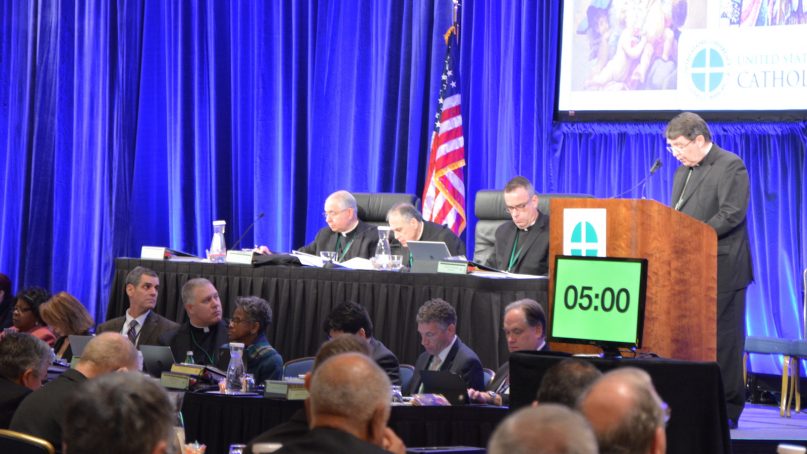BALTIMORE (RNS) — Observers are calling this week’s U.S. Conference of Catholic Bishops assembly a high-stakes opportunity for the bishops to address their role in the ongoing child sex abuse crisis that has rocked the church this year.
But USCCB president Cardinal Daniel DiNardo opened the event Monday (Nov. 12) by declaring that the Vatican had issued a last-minute directive for bishops to hold off on the votes, saying they should wait until after a global meeting of church leaders at the Vatican in February about sexual abuse.
“At the insistence of the Holy See, we will not be voting on the two action items,” DiNardo said, noting that the Vatican had informed him of the shift the day before. He added that he was “disappointed” by the news and acknowledged others gathered likely share his concerns.
Cardinal Blase Cupich of Chicago then stood to suggest that the bishops still discuss the “action items” on sexual abuse and hold a non-binding vote, as well as convene a special session in March on the issue after the February meeting. Action on the crisis, Cupich said, “is something we cannot delay — there’s an urgency here.”
The news was followed by an address from the Vatican’s apostolic nuncio to the United States, Archbishop Christophe Pierre, who spoke about the abuse crisis at length.
“One case of abuse is one case too many, so the people of God must remain vigilant,” he said.
RELATED: How the Great War gave us the US Conference of Catholic Bishops
DiNardo, who has himself faced allegations this year of being too slow to rein in abusive priests, then offered a presidential address focused on the crisis, though he noted it had been altered due to the delay ordered by the Vatican.
“To the survivors (of abuse) I have let down … please forgive me. For those who have lost faith in the church, please forgive us for our failures,” he said. He later added: “Whether we will be remembered as guardians of the abused or of the abuser will be determined by our actions today, and this week, and in the months ahead.”
The bishops had been poised to address the crisis in three potential ways: the creation of a commission to oversee allegations of abuse against bishops, affirming new “Standards of Episcopal Conduct” for bishops, and outlining protocols for bishops who leave office following sexual misconduct.
After the gathering, Zach Hiner, executive director of the Survivors Network of those Abused by Priests, expressed frustration at the decision to push off the votes.
“We’re disappointed that the Vatican has prevented the USCCB from taking even symbolic steps toward accountability for the clergy sex abuse crisis,” he said in a statement to Religion News Service.
“Given that nearly one-third of American bishops have been accused of mishandling claims of sexual abuse, this meeting came at a critical moment and presented an opportunity for those bishops to begin working toward real accountability and prevention. Instead, the Vatican has kicked the can down the road. Hopefully this means that at the meeting [in February], the Vatican will be implementing real reform and not empty codes of conduct.”
Peter Isley, one of the founding members of SNAP, also called the vote delay “totally unacceptable.”
During services on Monday, bishops heard from abuse victims who detailed harrowing accounts of the the long-term toll their experience took on their lives, relationships, and faith.
“We felt at times homeless in the city of God,” said abuse victim Teresa Pitt Green.
At an afternoon press conference, DiNardo reiterated his disappointment with the unexpected decision, noting “we are not ourselves happy about this.” But while DiNardo and Bishop Christopher Coyne of Vermont said bishops “absolutely want” to take action on the issue, they plan to respect the wishes of the Vatican’s Congregation for Bishops and push back the vote out of a desire to maintain a “collegial” role in the church.
“I think don’t this in any (way) signals a change in direction,” DiNardo said.





